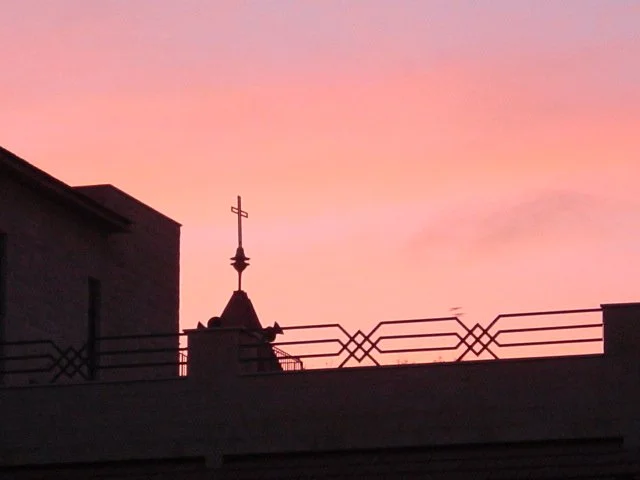May 27, 2003
Elizabeth woke up this morning to the slow mournful death knell, ringing from the Latin church belltower. It wasn't until she got to school that she learned that the one who passed away was our assistant principal's mother. This set a sad pall over the school, although exams continued unaffected.
After their meeting (which they have every day during exam period), the teachers walked over to the beit al-azza, the home of the deceased, to pay respects. This was the first time either of us had made such a visit before a funeral in Zababdeh, as loved ones mourned over the body. The men sat outside, silently drinking bitter coffee as the women teachers crammed ourselves in the doorway of a small room. Peering over shoulders, Elizabeth could see two older women sitting on the floor, on either side of their lost loved one, who was laid out on a cushion, dressed in white, with branches of fresh sage placed on her. In every other available space in the room were others, seated on white plastic chairs. As they wept, they sang: first, one would sing something, and the others all together with a kind of refrain. One of the teachers told Elizabeth that the "verses" of the song are not standard, but created by the women as they remember their loved one. She also said that, just as only men go to the burial in the cemetery, only women mourn over the body before the funeral. We teachers only stayed a respectful few minutes before going to another room to drink a shot of bitter coffee and then leave.
Marthame, meanwhile, was making his way back from Israel with another friend of a friend interested in visiting. Once in Zababdeh, we stopped by for watermelon with Fr. Thomas and coffee with Fr. Firas. We could hear tanks and shooting nearby on the main road, but it soon passed.
The sun set silhouettes the Latin Church’s bell tower.
In the early afternoon we went to the Latin Church courtyard. Elizabeth sat with women as they gathered outside before the funeral. Marthame joined the village clergy, who walked together from the Latin church to the beit al-azza, and then back again, preceded by acolytes and followed by the pallbearers with the coffin, mourning men, and finally mourning women. The church soon filled after the procession entered. The service is a simple one of witness to the resurrection - there's little singing, no eucharist, and everyone stands for the duration. The procession then moved onto the cemetery for burial.
Allah yerhamha. God have mercy on her.

